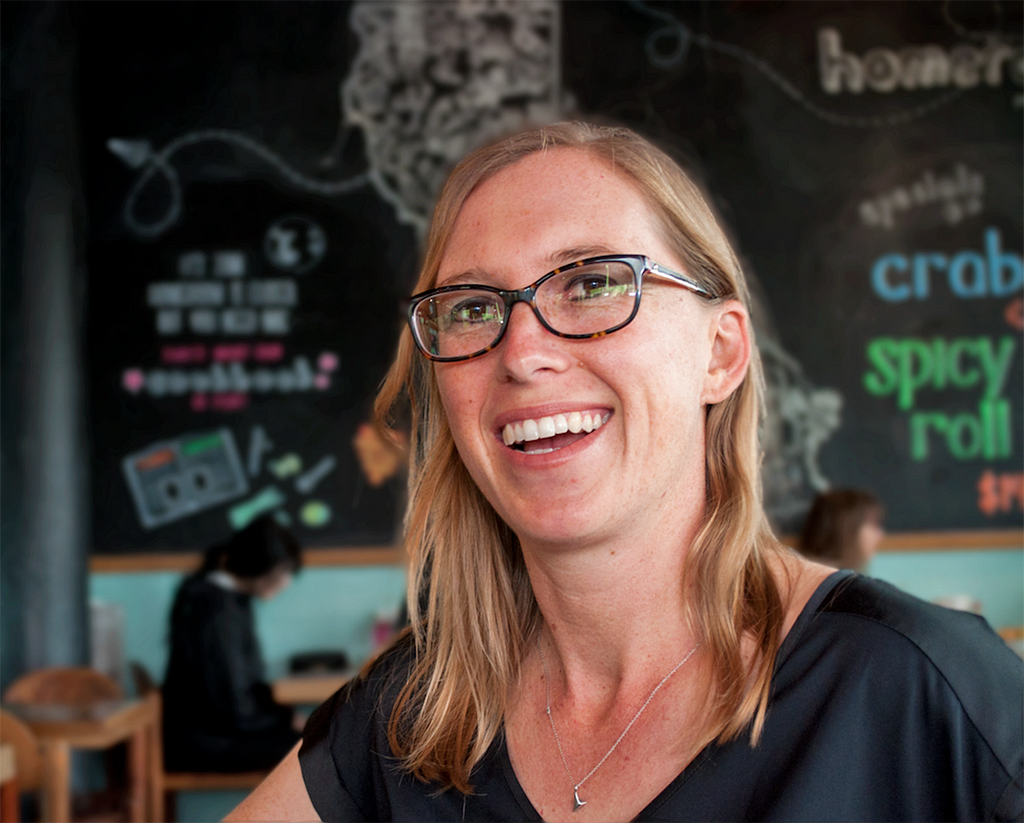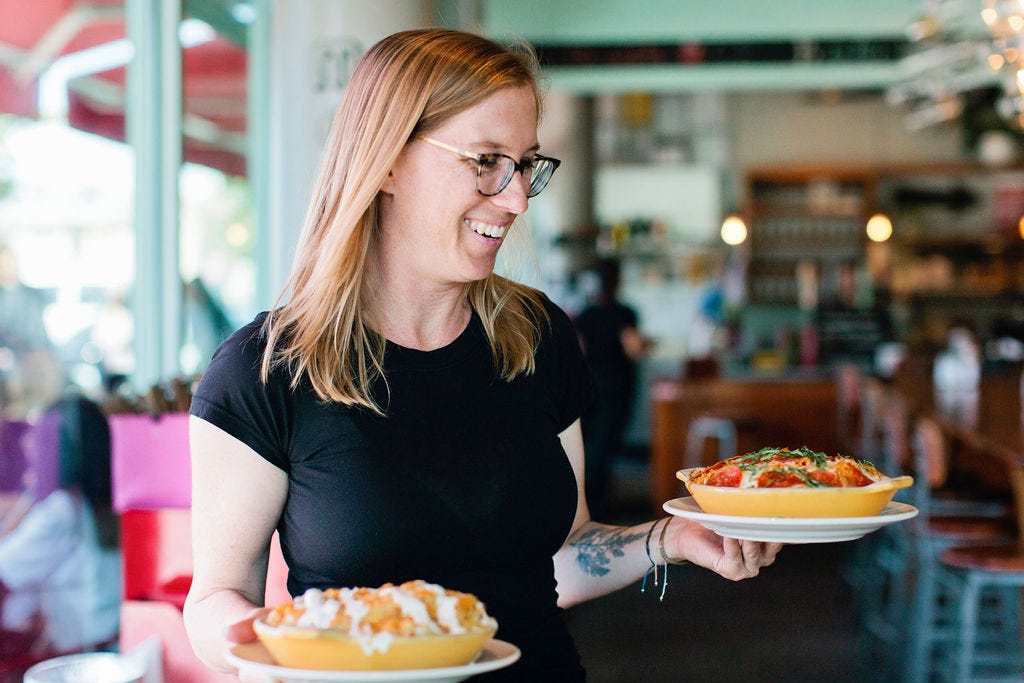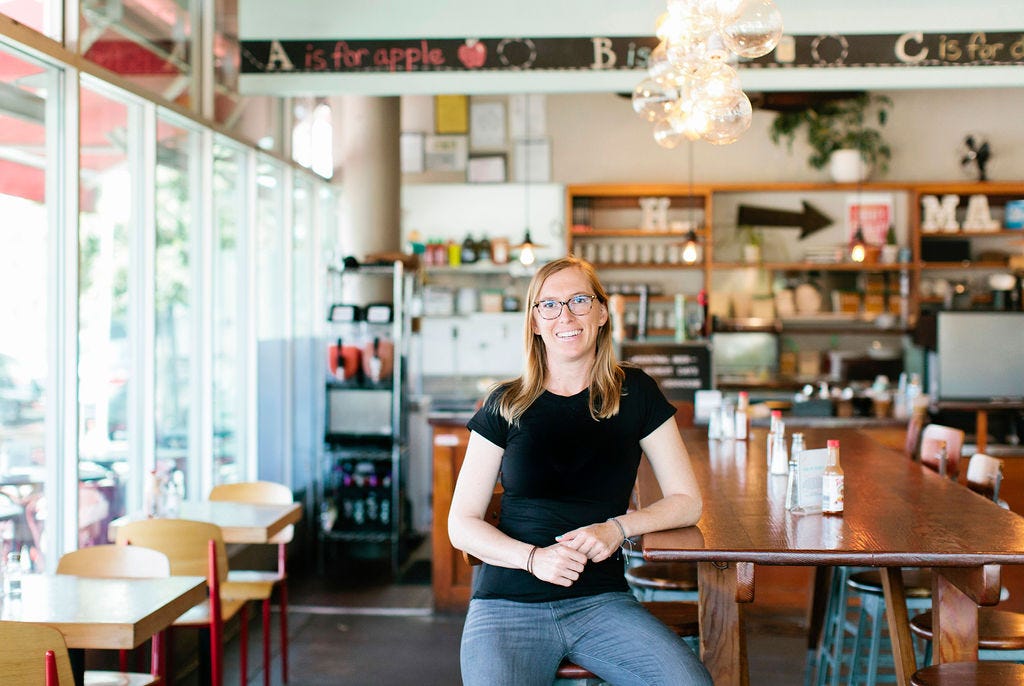Big Ideas: “Not On The Menu, a sexual harassment prevention system for restaurant workplaces” With Erin Wade of Homeroom

It started with an email. Or more accurately a lot of emails. One day a few years ago, my inbox was flooded with emails from servers at Homeroom chronicling regular and gnarly instances of sexual harassment from customers. As a female boss who wore her feminist leanings proudly, I was truly taken aback. How could this be happening at my restaurant? After freaking out, we sprang into action. I got together with all of the servers who had emailed me chronicling their experiences to begin a conversation about how to make things better. We listened to each other and began exploring how to make their workplace a safer place for everyone who worked there. We experimented and a few months into the process, they created what would eventually become the Color Code of Conduct.
I had the pleasure to interview Erin Wade. Erin owns the award-winning Oakland-based mac-and-cheese restaurant Homeroom, which has been recognized nationally for its progressive workplace policies, especially for its sexual harassment prevention system. The system that Erin created at Homeroom has been adopted as a national best practice by the Equal Employment Opportunity Commission (EEOC), and has been featured in outlets such as Mother Jones and The New York Times, and was also the topic of an op-ed that Erin penned for The Washington Post, which was named one of the paper’s favorite opinion pieces of 2018. In recognition of her groundbreaking work in the restaurant industry, Erin also named one of America’s “World Changing Women” by Conscious Company Magazine. Erin has now translated her restaurant’s nationally recognized sexual harassment prevention system into a roadmap that restaurants across the country can easily adopt as part of a new initiative called Not On The Menu, whose mission is to prevent sexual harassment in restaurant workplaces.
Thank you so much for joining us Erin. Can you tell us a story about what brought you to this specific career path?
I’ve always had two dueling passions — creating change and my love of food. By starting my own restaurant, I was able to marry those two interests.
Part of what I’ve come to realize is that, as a woman, there are some ways that I run my company that are distinctive. Because of my feminist leadership style, I’ve found myself looking for solutions to things like sexual harassment that other people have thought of as intractable problems.
Can you tell us about your “Big Idea That Might Change The World”?
The reality is that 1 in 10 Americans works in restaurants. As much as there has been a bunch of important press attention about chefs harassing their staff, that story ignores the larger problem of the millions of customers that the people who work in these restaurants come into contact with. I created Not On The Menu to help other restaurants address sexual harassment from customers. Adapted from the system that we use at Homeroom, our Color Code of Conduct that gives people an easy to use set of tools to address and prevent sexual harassment from customers.
It’s a very simple system that uses three colors — yellow, orange, and red — to denote different kinds of behavior from customers, and the system provides reaction and recourse for each color. A “yellow” indicates that the vibes are off at table and gives the server an opportunity to transfer the table to the manager. In an “orange” situation, a customer has shared some words or actions that, while still open to interpretation, make the server feel uncomfortable and the table will get transferred. A “red” happens anytime the language is explicitly sexual or there is any sort of physical touch. In case of a “red” the customer is asked to leave the restaurant.
In our experience, it turns out that very few people head straight to the red-zone. When you identify creepy behavior at the yellow and orange level and change the power dynamics immediately, it prevents code red situations from occurring. Over the last three years, Homeroom has served over a million mac and cheeses with only a handful of code reds on the restaurant floor during that time.

How do you think this will change the world?
It seems clear to me. If 1 in 10 Americans felt safe at work that would impact the happiness of millions of people!
Keeping “Black Mirror” and the “Law of Unintended Consequences” in mind, can you see any potential drawbacks about this idea that people should think more deeply about?
As with anything, I think the danger is in thinking that it’s a panacea. The truth is that if you have a toxic culture in your restaurant, then implementing the Color Code of Conduct won’t stop sexual harassment. The Color Code of Conduct works well as stopping sexual harassment before it escalates, but there are plenty of reasons that people wouldn’t implement it. The true solution is balance in leadership and we are very far away from that.
Was there a “tipping point” that led you to this idea? Can you tell us that story?
It started with an email. Or more accurately a lot of emails.
One day a few years ago, my inbox was flooded with emails from servers at Homeroom chronicling regular and gnarly instances of sexual harassment from customers. As a female boss who wore her feminist leanings proudly, I was truly taken aback. How could this be happening at my restaurant?
After freaking out, we sprang into action. I got together with all of the servers who had emailed me chronicling their experiences to begin a conversation about how to make things better. We listened to each other and began exploring how to make their workplace a safer place for everyone who worked there.
We experimented and a few months into the process, they created what would eventually become the Color Code of Conduct.
What do you need to lead this idea to widespread adoption?
Honestly? A lot of financial resources and time I don’t have.
The reality is that it’s very hard to do preventative work, especially with an issue like sexual harassment where everyone is so worried about getting it wrong. In some ways, we’re in a moment where people are like “Well, if no one has publicly told me I’m a total creep, I must be fine.”
What are your “5 Things I Wish Someone Told Me Before I Started” and why. (Please share a story or example for each.)
I don’t believe in the premise here. I think you’ve got to make your own mistakes and learn things on your own.
Don’t get me wrong, resources are great and I read a lot. But ultimately, I learn by doing. My experience has been that no one is going to be able to give you the wisdom that you’re going to need.
That being said, I’d offer up both of the following as things I wish I’d learned earlier:
- Do the work that only you can do and get other people to do everything else.
- You’ve got to build your team to do everything you’re not as good at, or more specifically the work that isn’t your special gift.
- There are other people who can do the things that you aren’t designed for or energized by. Trying to do that stuff just wastes a lot of time.
- Block off time for yourself every week and keep it sacred and communicate it to people.
- There will always be a fire to put out, you’ve got to take care of yourself

The future of work is a common theme. What can one do to “future proof” their career?
Continually check in about where your passion truly is. The people who have the most incredible careers approach it with that kind of passion — money shows up and opportunities show up. Most people don’t approach their careers that way. If you are coming from a place of passion, you’re going to understand what’s changing in your industry. If you’re just doing what you need to do to fit in, I don’t think you’ll ever get ahead.
Based on the future trends in your industry, if you had a million dollars, what would you invest in?
I would invest in ten $100,000 chunks and invest them in female food entrepreneurs to get their businesses off the ground. The way that women approach business is unique and has been deeply undervalued. Those investments would create not only the highest rate of financial returns but would have the potential to transform the communities where those businesses are located. There are plenty of studies that show that female leadership in business improves financial returns, but what is not being discussed is the kind of companies they are creating. What female business leaders are doing in their communities and in their workplaces — that social return is just as large.
Which principles or philosophies have guided your life? Your career?
The best decisions in my life have come from what I’m inspired to do instead of what is prudent or expected.
You really only get one opportunity to do this and I think we’re taught to write off huge swaths of our lives in service of a paycheck or what you’re supposed to do instead of what you’re inspired to do.
Can you share with our readers what you think are the most important “success habits” or “success mindsets”?
Having a “growth mindset” over a “fixed mindset” where you feel genuinely open to failure as an instructive experience. It encourages a willingness to challenge your beliefs constantly and change them and adopt new ones.
Being open and communicative about having some kind of self-care routine or habits . If you’re not communicating about it that time can be very easy to schedule over in the short term, but in the long term you’re gonna burn out and so will your team. You set an example for everyone when you take care of yourself.
I’d also offer some version of “Don’t let the great be the enemy of the good.” The people who I see who are least successful want things to be perfect so they never even try. Having an openness to exploration makes it so that the adventure is the success.
Some very well known VCs read this column. If you had 60 seconds to make a pitch to a VC, what would you say? He or she might just see this if we tag them ?
I want to do more work amplifying the business case for feminist leadership. Right now, there are too few compelling examples of feminist leadership, but it’s not because women aren’t at the helm.
All too often female innovators are erased by a business culture obsessed with “moving fast and breaking things.” I am uninterested in telling women that they need to be someone else. I want to recognize and validate the skills and approaches they already employ. I want to celebrate feminist leadership across the business sector.
How can our readers follow you on social media?
- @erinwade8
- @werenotonthemenu
Big Ideas: “Not On The Menu, a sexual harassment prevention system for restaurant workplaces” With E was originally published in Authority Magazine on Medium, where people are continuing the conversation by highlighting and responding to this story.



